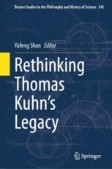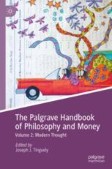Search
Search Results
-
Alexandre Kojève: revolution and terror
When discussing the French Revolution and Napoleon in his lectures from 1933 to 1939, Alexandre Kojève had in mind events in Russia. The clash...
-
Enlightenment and Revolution
This chapter examines Kant’s role in Foucault’s views on revolution and Foucault’s adoption of the Enlightenment attitude of criticism toward the...
-
Permanent Transformism
The whole corpus of the Notebooks is based on a condition for scientific research: to understand the deep roots of the drama that led to fascist...
-
The Role of Mathematics in the Copernican Revolution
The Copernican revolution can conveniently be divided into two, partly overlapping, phases. The first phase comprises the work of Copernicus and...
-
“Tickets of Despotism”: Edmund Burke on the Assignats, Abstract Theory, and the French Revolution
Edmund Burke’s critical treatment of the assignats in the Reflections on the Revolution in France is crucial to understanding his broadside against...
-
L’Ancien Régime et la Révolution (1856) (Der alte Staat und die Revolution)
Der erfolgreiche Putsch Louis-Napoléon Bonapartes und der damit besiegelte Untergang der Zweiten Französischen Republik lässt Tocqueville, der sich...
-
The Permanent Transition of Postcolonial Constitution Writing in Sudan’s First and Second Republics
This chapter analyses how contradicting conceptions of the Sudanese nation, partially rooted in the colonial experience, led to Sudan’s transitional...
-
Transforming Cognition and Human Society in the Digital Age
Since the onset of the digital revolution, humankind has experienced an unprecedented acceleration of changes triggered by technological...
-
Privates/Öffentliches
Als AristotelikerAristoteles (s. Kap. 19) kann man Tocqueville nicht bezeichnen. Es gibt in seinem Hauptwerk, Über die Demokratie in Amerika, und...
-
Revolution Versus Evolution: The Pattern of Conceptual Change in Science
Scientific revolution is a widely known concept. But does revolution really occur in science? Change through revolution means that present thinking...
-
The Dichotomy of Opposition Between the Image of Technology and the Pre-Technological Era in Martin Heidegger’s Philosophy of Art
Globalization and the digital revolution have forced a rethink of many philosophical works of the 20th century. Among them, Martin Heidegger’s ideas...

-
Soziale Anerkennungswettläufe
Die sogenannte „digitale Revolution“ ist keine Bewegung, die etwa aus einer globalen Krise, aus Verteilungsungerechtigkeiten oder aus einem...
-
Rethinking The Philosophers’ Steamboat: the tragedy of Sergei Bulgakov
Among those included in the lists of being sent out in 1922 as part of the “Philosophers’ Steamboat,” there was Sergei Nikolayevich (Father Sergius)...
-
L’Ancien Régime et la Révolution (1856) (Der alte Staat und die Revolution)
Der erfolgreiche Putsch Louis-Napoléon Bonapartes und der damit besiegelte Untergang der Zweiten Französischen Republik lässt Tocqueville, der sich...
-
Patriotism as Freedom and the Law: Hegel as Read by Robespierre
Patriotism is not commonly associated with freedom. Even less so when Hegel is evoked. By reading Hegel’s concept of patriotism through the lens of...
-
Emergency
In the context of the Great Acceleration of the Anthropocene, emergency becomes a permanent state. However, there are two main reasons why the...
-
The Military History Museum of the Bundeswehr in Dresden
After 10 years of redesign, the Military History Museum of the Bundeswehr (MHM) in Dresden opened its new permanent exhibition in October 2011. The...
-
The Authority of Revolution: Durkheim After Arendt
My contribution aims to show how, according to Durkheim and Arendt, the self-instituting processes initiated by the American and French Revolutions...
-
Utopia and Dystopia
Utopia, associated with the scientific revolution and the Enlightenment, cannot be thought of but in relation to apocalypse. It thus follows that...
